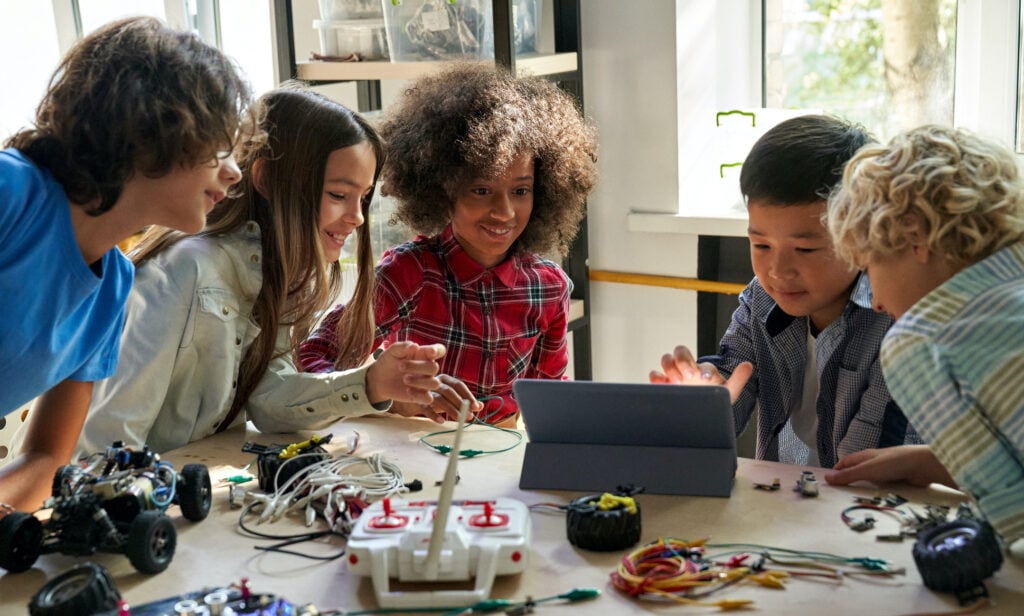Making STEM Accessible and More Inclusive
Education in science and technology isn’t always inclusive. Dr. Christopher Emdin shares positive and doable ways to make STEM education accessible to all kids, regardless of their skin color, economic status, or background.

We live in a world where children are constantly exposed to toxicity in various forms. There are chemicals in their plastic toys and harmful messages in the cartoons and media they consume.
Many parents, when they become aware of all that their children are being bombarded with, go into protection mode.
Too often, the quest to find what the next thing young people should be protected from distracts from addressing what I believe to be the most toxic thing children are exposed to – narratives and language that instills and reinforces limitations on the possibilities for their lives.
Encouraging Kids of Color to Think Like a Scientist
From as early as three years old, children start forming perceptions about what they can and can’t do. They start believing in only certain parts of who they are and start avoiding certain subjects, hobbies and activities that they believe are not for them.
From their first breath, children’s identities are forming. Everything they soak in from their surroundings shapes them. They observe, pose questions, form hypotheses, experiment, and draw conclusions naturally. They approach the world as scientists. However, as parents search for and block perceived threats, they become preoccupied with parenting from a place of defending students against potential harms and fail to foster the natural gifts that their children possess.
In the worlds of sports, gaming and even military combat, the phrase “the best defense is a good offense” has been shared by the most revered thought leaders.
The sentiment behind the quote is that strengthening what you have and moving towards a shared mission can be a more powerful and effective way to protect or prevent harm. I believe that this approach must be brought to parenting.
Making STEM Accessible to All Kids
Most importantly, I propose that we think about offensive parenting – especially as it relates to getting children reconnected to STEM.
A parenting approach centered on offense understands that while there is a necessary defense in the early days, the goal is to set up kids with such a strong offense, they can play – and win – at the game of life.
Offense here refers to focusing less on what to defend children from and more on what to instill in them. To parent well is to prepare children to believe in themselves and move offensively towards goals that will help them be successful.
It is essential to know that STEM ability is distributed evenly across the populace. All children employ the scientific method and scientific reasoning to solve everyday problems. The very first set of knowledge a newborn uses is scientific knowledge. However, by the time they reach the third grade, they are making decisions about whether or not they can be scientists or mathematicians.
Assure Kids They Are “Smart Enough” in Math & Science
Hundreds of interviews with young people across the country reveal that many students who exhibit what I call science-mindedness (make keen observations, curious, anti-authoritarian, thoughtful, curious, analytical) also say that “science is hard” or “I’m not good at math.”
Many of these students, particularly those who were not doing well in science or math classrooms, also believe that the reason they are not doing well is that they are not “smart enough.”
In my book, STEM STEAM Make Dream, I interviewed a number of big thinkers, influential scientists and engineers. What they all have in common is a belief in their abilities and a recognition that even if they don’t have all the answers, they can still be successful in their respective disciplines.
The reality is that even if their schools were not designed for them to love science, math, or related subjects, they had the gift of belief in self and that is the first step in their finding success in STEM. This is a critical factor in making STEM accessible.
While researchers come up with endless reasons for why children cannot do well in STEM, one of the fundamental issues that we overlook is what we focus on as parents.
Our attempts to be protective and defensive leaves our children open to develop perceptions of self that do damage to their identity and places limitations on what they can become. In response, I suggest that parent go on the offensive and emphasize to young people who they are and what they can do.
Point Out When They’re Thinking Like a Scientist
One of the chief way this gets done is through a recognition of when children express their scientific knowledge even in “non-scientific” scenarios.
When they pose questions and draw conclusions, tell them they are acting and thinking like scientists.
When they estimate the time for a car trip or guess how much money is in their piggy bank, tell them they are being mathematicians.
Give them opportunities to engage in science at home. Have they shown an interest in space? Make a simple plan to do a couple of solar eclipse activities or lunar eclipse activities together.
Parenting on the offense also includes inundating children with affirmations. They should hear as often as possible that they are smart, can handle challenging situations, and that they are resilient kids. Parents need to have phrases about STEM and their children’s ability in these disciplines that are repeated to them so often that when society tries to convince them otherwise, they simply cannot fathom it.
Parenting on the offense also involves surrounding children with STEM heroes. The environment where children live and grow should have STEM themed books, pictures and posters on the wall of people who look like them. This allows children to normalize STEM and start approaching it like it is reachable.
